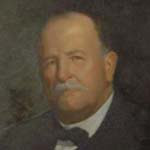

Acting President of Chile
20, 1876 Talca, Chile
April 9, 1957(1957-04-09) (80) Santiago, Chile
July 26, 1931 (1931-07-26 ) – July 27, 1931 (1931-07-27 )
Chilean politician Pedro Opaso Letelier (July 20, 1876 – April 9, 1957) was a Chilean politician and provisional vice president of Chile in 1931. He was born in Talca, the son of Ursicino Opaso and Margarita Letelier. He completed his studies in his native city, and then attended the Universidad de Chile, where he became a physician. He started his political career as the first mayor of the city of Río Claro. In 1920 Opaso was named minister in several occasions as a representative of the Democratic Liberal Party. He was elected a deputy for Curicó (1921–1924) and a Senator for Talca (1924–1930) and Talca, Linares and Curico (1930–1932). At the time of the collapse of the first administration of Carlos Ibáñez del Campo in 1931, he was the President of the Senate. As such he took over as provisional vice president. He assumed on July 26, and that same night he formed his cabinet, headed by Juan Esteban Montero as interior minister and Pedro Blanquier, the other key player, as Finance minister. When the ministers arrived on the next morning, Opaso resigned by decree on Montero. His entire administration had lasted less than 24 hours. The speed he demonstrated to get rid of the power earned him the nickname of The Relayer (Spanish: El Pasador), that accompanied him till his death. After his very brief administration, he was elected Senator for Curicó, Talca, Maule y Linares (1933–1949) and again President of the Senate in 1944. He died in Santiago in 1957. Political offices Preceded by Régulo Valenzuela Minister of War and Navy 1920 Succeeded by Ladislao Errázuriz Preceded by Enrique Oyarzún President of the Senate of Chile 1930–1932 Succeeded by Alberto Cabero Preceded by Carlos Ibáñez del Campo Vice President of Chile 1931 Succeeded by Juan Esteban Montero Preceded by Florencio Durán President of the Senate of Chile 1944 Succeeded by José Francisco Urrejola vtePresidents of the Senate of ChilePre-Republican Chile (1812–1833)Patria Vieja (1812–14) Vivar (1812–13) Henríquez (1813) Egaña (1813) Ruíz-Tagle (1813–14) Patria Nueva (1818–23) O'Higgins Period (1818–23) Eyzaguirre (1822–23) Ruíz-Tagle (1823) Organization of the Republic (1823–29) Elizondo (1826) Vial del Río (1823–24) Eyzaguirre (1824–25) Egaña (1825–27) Freire (1827) B. del Solar Marín (1827–28) Fariñas Ugalde (1827–28) Vicuña (1829) Chilean Civil War of 1829–1830 First Republic 1833 Constitution (1833–1925)Conservative Period (1831–61) Errázuriz Aldunate (1833–34) Cienfuegos (1834–35) Vial Santelices (1835–37) Benavente (1837) Elizondo (1837–39) J. del Solar Marín (1839–40) Gandarillas (1839–40) Benavente (1841–42) J. Urrutia Manzano (1842–43) Alcalde Bascuñán (1843–44) Formas (1844) Ortúzar Formas (1844–45) J. del Solar Marín (1845–46) Vial del Río (1846) Pinto (1846–51) Vial Formas (1851–52) Pérez (1852–53) Lazcano Mujica (1853–54) Subercaseaux Mercado (1854–55) Urmeneta (1855–56) Larraín (1856–57) Benavente (1857–58) Alcalde Bascuñán (1858–59) Cosuiño (1859–61) Liberal Period (1861–91) Correa de Saa (1861–63) Cosuiño (1863–64) Torres de Velasco (1864–65) Matte Messia (1865–66) Ossa Mercado (1865–67) Concha y Toro (1867–68) de Borja (1868–69) Errázuriz (1869–70) Correa de Saa (1870–71) Vicuña (1871–72) Borgoño (1872–73) Concha y Cerda (1873–75) Aldunate (1875–76) A. Reyes Cotapos (1876–77) Matte Messia (1877–78) Valdés (1878–79) Lastarria (1879–80) Vicuña Mackenna (1880–82) Vial Formas (1882–84) Martínez Cuadros (1984) Varas (1884–85) Altamirano (1885–86) A. Ibáñez (1886–87) Castillo Andueza (1887–88) Vicuña Guerrero (1888–89) Reyes Palazuelos (1889–90) Covarrubias (1890–91) A. Matte Pérez (1891) Parliamentary Period (1891–25) Silva (1891–92) Gandarillas (1892–93) Reyes Palazuelos (1893–94) S. Sanfuentes (1894–95) Reyes Palazuelos (1896) Barros Luco (1896–97) Lazcano (1897–98) Edwards (1898) J. Errázuriz Echaurren (1898–00) Blanco (1900–02) Valdés Cuevas (1902–03) Lazcano (1903–04) Rozas Garfias (1904–05) Puga (1905–06) Sanfuentes (1906–07) Matte (1907–08) Reyes Palazuelos (1908) Escobar (1908–09) Reyes Palazuelos (1909) Vergara Ruíz (1909) R. Matte Pérez (1909–12) Valdés Vergara (1912–13) Aldunate Solar (1913–14) Ochagavía (1914–15) Charme (1915–18) Tocornal (1918–19) Claro (1920–24) Yáñez (1924) Second Republic 1925 Constitution (1925–1973) Oyarzún (1925–30) Opaso (1930–32) Cabero (1932–33) I. Urrutia Manzano (1933–34) Marambio (1934–35) I. Urrutia Manzano (1935–36) Maza (1935–37) Cruchaga Tocornal (1937–41) Durán (1941–44) Opaso (1944) Urrejola (1944–45) Alessandri Palma (1945–49) Alvarez (1949) Alessandri Palma (1949–50) F. Alessandri Rodríguez (1950–58) Pérez de Arce (1958) Videla (1958–62) Zepeda (1962–65) Ahumada (1965) Reyes Vicuña (1965–66) Maurás (1966) Reyes Vicuña (1966) S. Allende (1966–69) Pablo (1969–71) Aylwin (1971–72) Palma (1972–73) Acuña (1973) Frei Montalva (1973) Pinochet dictatorship (1973–1990) Government Junta Third Republic 1980 Constitution Transition to democracy (1990–present) Valdés (1990–95) Diez (1995–96) Romero Pizarro (1996–97) Zaldívar (1997–04) H. Larraín (2004–05) Romero Pizarro (2005–06) Frei Ruiz-Tagle (2006–08) Zaldívar (2008–09) Novoa (2009–10) Pizarro (2010–11) Girardi (2011–12) Escalona (2012–13) Pizarro (2013–14) I. Allende (2014–15) Walker (2015–16) Lagos (2016–17) Zaldívar (2017–18) Montes (2018–19) Quintana (2019–20) Muñoz (2020–21) Provoste (2021–) This article about a Chilean politician is a stub. You can help Wikipedia by expanding it.vte

We use cookies
We use cookies and other tracking technologies to improve your browsing experience on our website, to show you personalized content and targeted ads, to analyze our website traffic, and to understand where our visitors are coming from. Privacy Policy.